


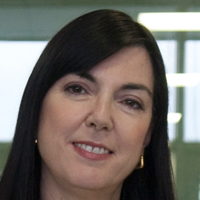 Adriana Albini is born in Venice (I) and works in Milan, married, with two children.
Adriana Albini is born in Venice (I) and works in Milan, married, with two children.
She is currently a Full Professor of General Pathology, Department of Medicine, at Milano Bicocca University. She is the Director of the Laboratory of Vascular Biology and Angiogenesis of the Fondazione MultiMedica Milan. She has a Ph.D in Chemistry and trained from 1980 to 1983 as a Biochemist and postdoctoral fellow at Max-Planck Institute for Biochemistry, Martinsried bei Muenchen, Germany. From 1985 to 1988 worked as “Visiting Scientist” at NIH, Bethesda MD (USA).
In 2018 was elected in the Board of Directors of AACR (American Association for Cancer Research) the oldest association for cancer research in the world with about 40,000 members
She has been President of the Italian Society for Cancer Research (SIC) and President of Metastasis Research Society (MRS).
She is member of the following editorial boards of scientific journals: Journal of the National Cancer Institute, Carcinogenesis, Molecular Cancer Therapeutics, Cancer Prevention Research.
She Member of Panel L4 ERC Consolidator Grants.
She is member of the Scientific Council of ESO (European School of Oncology).
She has over 350 scientific publications in peer review journals. She is among the most cited Italian women scientists with h index (a measure of citations) of 84.
Her major focuses are in vitro and in vivo models for angiogenesis and inflammation, vascular biology, microenvironment, mechanisms of invasion of endothelial cells. Her major interest is anti-angiogenesis in a chemopreventive setting. She workd on dietary derivatives and repurposed drugs for prevention.
She developed major assays in invasion and angiogenesis and has numerous patents in the field.
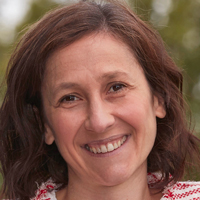 Elisabetta received her PhD from the European School of Molecular Medicine (SEMM) in Milan
where she studied the role of ubiquitination in EGF receptor signalling and endocytosis in the labs
of Simona Polo and Pier Paolo Di Fiore. In 2009, she joined Wouter Moolenaar’s group at The
Netherlands Cancer Institute in Amsterdam for her post-doctoral work on the regulation of integrin
trafficking and signalling by lipid growth factors and intracellular chloride channels. Subsequently,
she got interested in translational cancer research and, as senior postdoctoral fellow in the
laboratory of Marcel Verheij at the same institute, she characterised the uptake mechanisms of
alkyl-lysophospholipid drugs. Elisabetta joined The EMBO Journal in 2017 where she is responsible
for the areas of membranes & intracellular transport and cell death & autophagy.
Elisabetta received her PhD from the European School of Molecular Medicine (SEMM) in Milan
where she studied the role of ubiquitination in EGF receptor signalling and endocytosis in the labs
of Simona Polo and Pier Paolo Di Fiore. In 2009, she joined Wouter Moolenaar’s group at The
Netherlands Cancer Institute in Amsterdam for her post-doctoral work on the regulation of integrin
trafficking and signalling by lipid growth factors and intracellular chloride channels. Subsequently,
she got interested in translational cancer research and, as senior postdoctoral fellow in the
laboratory of Marcel Verheij at the same institute, she characterised the uptake mechanisms of
alkyl-lysophospholipid drugs. Elisabetta joined The EMBO Journal in 2017 where she is responsible
for the areas of membranes & intracellular transport and cell death & autophagy.
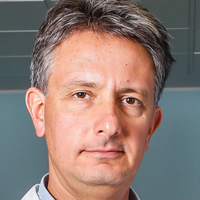 Full Professor at Dept. of Oncology, University of Torino and Director of the Laboratory of Molecular Oncology at Candiolo Cancer Institute IRCCS. President of the EACR-European Association for Cancer Research.
Full Professor at Dept. of Oncology, University of Torino and Director of the Laboratory of Molecular Oncology at Candiolo Cancer Institute IRCCS. President of the EACR-European Association for Cancer Research.
His work is aimed at developing precision medicines for cancer patients. As a postdoc at the Johns Hopkins University (USA), in the group led by Bert Vogelstein, he performed the first comprehensive mutational profile of kinases in colorectal cancers (CRC).
As an independent investigator he has then translated these findings into clinical practice by discovering the molecular landscape of response and resistance to EGFR, HER2 and NTRK1 blockade in CRC. These findings have found clinical applicability and were translated in blood-based tests (liquid biopsies) that are presently used to monitor patient’s response during treatment. A future focus of his lab is to study how the emergence and evolution of drug-resistant clones can be restrained to improve the efficacy of anticancer agents, that is to develop therapies that adapt to tumor’s evolution.
In 2014 Prof Bardelli has been listed in the Thomson Reuters List of Highly Cited Researchers. In 2016 won the Grant for Oncology Innovation Research Project and in 2017 has been recognised with the ESMO Translational Research Award.
He is the author of over 200 peer-reviewed manuscripts (H factor 81).
 Christer Betsholtz’ research revolves around the different cell types that make up blood vessels and their interaction during angiogenesis, in organ-specific micro-vascular physiological processes and during disease and tissue repair. One of the organs in focus for his investigations is the central nervous system, in which the blood vessels are endowed with a so-called blood-brain barrier, which regulates the passage of water, nutrients and waste products to and from the brain parenchyma. He studies this and other vascular specializations primarily in the mouse using a combination of techniques including genetics, imaging and single-cell RNA sequencing.
Christer Betsholtz’ research revolves around the different cell types that make up blood vessels and their interaction during angiogenesis, in organ-specific micro-vascular physiological processes and during disease and tissue repair. One of the organs in focus for his investigations is the central nervous system, in which the blood vessels are endowed with a so-called blood-brain barrier, which regulates the passage of water, nutrients and waste products to and from the brain parenchyma. He studies this and other vascular specializations primarily in the mouse using a combination of techniques including genetics, imaging and single-cell RNA sequencing.
Christer Betsholtz took his PhD at Uppsala University in 1986 and moved to Gothenburg University as Professor of Medical Biochemistry in 1994. Initially focusing on PDGF and cancer, he found that PDGF-B signaling drives the recruitment of pericytes to blood vessels and became more broadly interested in angiogenesis and the interplay between different cell types in this process. In 2004, he moved to the Karolinska Institute in Stockholm, and since 2013 he shares his time between Uppsala University as Professor of Vascular and Tumor Biology, and Karolinska Institute as Director of the Astra/Zeneca/Karolinska Integrated Cardio-Metabolic Center (ICMC).
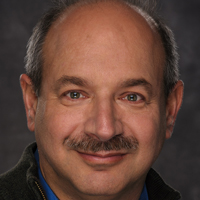 Bruce Beutler received his undergraduate degree from the University of California at San Diego in 1976, and his MD degree from the University of Chicago in 1981. As a postdoc at Rockefeller University, Beutler isolated mouse tumor necrosis factor (TNF) and was the first to demonstrate that TNF acts as a key executor of the host response to bacterial lipopolysaccharide (LPS), and more generally, mediates inflammation. He also developed inhibitors of TNF activity that are still used clinically to treat inflammatory diseases. Then, curious about how innate immune recognition occurs in the first place, Beutler used positional cloning to identify the LPS receptor. In recognition of this work, Beutler shared the 2011 Nobel Prize in Physiology or Medicine with Jules Hoffmann and Ralph Steinman, “for studies related to the activation of innate immunity.”
Bruce Beutler received his undergraduate degree from the University of California at San Diego in 1976, and his MD degree from the University of Chicago in 1981. As a postdoc at Rockefeller University, Beutler isolated mouse tumor necrosis factor (TNF) and was the first to demonstrate that TNF acts as a key executor of the host response to bacterial lipopolysaccharide (LPS), and more generally, mediates inflammation. He also developed inhibitors of TNF activity that are still used clinically to treat inflammatory diseases. Then, curious about how innate immune recognition occurs in the first place, Beutler used positional cloning to identify the LPS receptor. In recognition of this work, Beutler shared the 2011 Nobel Prize in Physiology or Medicine with Jules Hoffmann and Ralph Steinman, “for studies related to the activation of innate immunity.”
From 2000 forward, Beutler used random germline mutagenesis in the mouse to identify many molecules with non-redundant function in the immune response—and other biological processes as well. In post-Nobel work, he developed methods for extremely rapid identification of causative mutations, to the point that forward genetics in the mouse is now limited only by the rate at which phenotypes can be produced and detected in screens.
Beutler is currently a Regental Professor and Director of the Center for Genetics of Host Defense at the University of Texas Southwestern Medical Center at Dallas.
"photo taken by Brian Coats for UT Southwestern Medical Center"
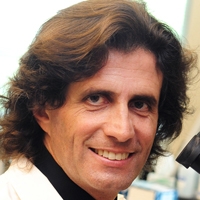 Michele Carbone, M.D., Ph.D., is the William and Ellen Melohn Chair in Cancer Biology, Professor of Pathology, Director Thoracic Oncology at University of Hawaii Cancer Center, an NCI-designated cancer center that Carbone built and directed for 6 years, in Honolulu. He is board certified in Anatomical Pathology, both in Italy and in the US, and he has a PhD in human pathology. His current research funding includes grants from the NIH, NCI, US Department of Defense, and donations from the UH Foundation. Carbone’s research is a combination of the field-work he conducted over 12 years in Cappadocia and in remote areas of the world, with sophisticated molecular genetics work and vital clinical-diagnostic work in his laboratory. Going against current dogma, he hypothesized and then proved that genetics synergizes with mineral fibers to cause mesothelioma. He discovered that heterozygous germline BAP1 mutations cause a novel cancer syndrome with 100% penetrance, and that gene X environment interaction modulates the incidence of mesothelioma, eye melanoma, and other human cancers. Subsequently he elucidated the mechanisms of BAP1 activity. He tracked some of the BAP1 mutations to a founder couple who immigrated in the US in 1716, built a family tree of ~80,000, and linked germline mutations to improved prognosis. He implemented preventive and early detection strategies among the affected family members he is studying, which have saved many lives. Moreover, he demonstrated that somatic biallelic BAP1 mutations are the most common genetic alteration in mesothelioma and elucidated the mechanisms. His findings have been reproduced and expanded by many laboratories: BAP1 genetic screening is now routine in the US and abroad.
Michele Carbone, M.D., Ph.D., is the William and Ellen Melohn Chair in Cancer Biology, Professor of Pathology, Director Thoracic Oncology at University of Hawaii Cancer Center, an NCI-designated cancer center that Carbone built and directed for 6 years, in Honolulu. He is board certified in Anatomical Pathology, both in Italy and in the US, and he has a PhD in human pathology. His current research funding includes grants from the NIH, NCI, US Department of Defense, and donations from the UH Foundation. Carbone’s research is a combination of the field-work he conducted over 12 years in Cappadocia and in remote areas of the world, with sophisticated molecular genetics work and vital clinical-diagnostic work in his laboratory. Going against current dogma, he hypothesized and then proved that genetics synergizes with mineral fibers to cause mesothelioma. He discovered that heterozygous germline BAP1 mutations cause a novel cancer syndrome with 100% penetrance, and that gene X environment interaction modulates the incidence of mesothelioma, eye melanoma, and other human cancers. Subsequently he elucidated the mechanisms of BAP1 activity. He tracked some of the BAP1 mutations to a founder couple who immigrated in the US in 1716, built a family tree of ~80,000, and linked germline mutations to improved prognosis. He implemented preventive and early detection strategies among the affected family members he is studying, which have saved many lives. Moreover, he demonstrated that somatic biallelic BAP1 mutations are the most common genetic alteration in mesothelioma and elucidated the mechanisms. His findings have been reproduced and expanded by many laboratories: BAP1 genetic screening is now routine in the US and abroad.
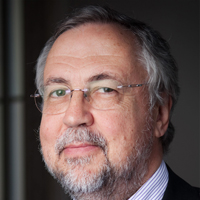 Giulio Cossu is Constance Thornley Professor of Regenerative Medicine at the University of Manchester. He received his MD degree from the University of Rome, then moved as Fogarty fellow at the University of Pennsylvania and in 1983 became Research Associate in Rome. In 1990 he spend an extended sabbatical at Pasteur Institute in Paris. In 1992 he became Professor of Histology and Embryology in Rome. In 2000 he moved to Milan as Director of the Division of Regenerative Medicine at San Raffaele. In 2012 he moved as Professor of Human Stem Cell Biology to University College London and in 2013 to the University of Manchester. He has been working as CAT member at EMA (2012-13). He is EMBO Member, Member of the European Academy of Science, Fellow of the Academy of Medical Sciences and of the Accademia dei Lincei. Giulio Cossu is recognized for his pioneering work on muscle development and on cell therapy for muscular dystrophies where he has conducted a first in man trial and is conducting a second one on cell-mediated gene therapy. He has published about 240 peer-reviewed papers (H index 70) and secured grants for more than15 M€.
Giulio Cossu is Constance Thornley Professor of Regenerative Medicine at the University of Manchester. He received his MD degree from the University of Rome, then moved as Fogarty fellow at the University of Pennsylvania and in 1983 became Research Associate in Rome. In 1990 he spend an extended sabbatical at Pasteur Institute in Paris. In 1992 he became Professor of Histology and Embryology in Rome. In 2000 he moved to Milan as Director of the Division of Regenerative Medicine at San Raffaele. In 2012 he moved as Professor of Human Stem Cell Biology to University College London and in 2013 to the University of Manchester. He has been working as CAT member at EMA (2012-13). He is EMBO Member, Member of the European Academy of Science, Fellow of the Academy of Medical Sciences and of the Accademia dei Lincei. Giulio Cossu is recognized for his pioneering work on muscle development and on cell therapy for muscular dystrophies where he has conducted a first in man trial and is conducting a second one on cell-mediated gene therapy. He has published about 240 peer-reviewed papers (H index 70) and secured grants for more than15 M€.
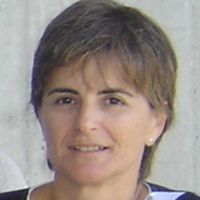 Antonella De Matteis leads the Programme of Cell Biology and Disease Mechanisms at the Telethon Institute of Genetics and Medicine (TIGEM) and is professor of Biology at the Federico II University in Naples. She received a medical degree from the University of L’Aquila, where she also completed her residency in Internal Medicine and in Endocrinology. She then switched to the study of the cell biology of secretion when she joined the Mario Negri Institute for Pharmacological Research in Milan. She has been a co-founder and Group Leader of the Consorzio Mario Negri Sud until 2009, when she joined the Telethon Institute of Genetics and Medicine in Naples. In 2016 she has been awarded an Advanced Investigator ERC grant.
Antonella De Matteis leads the Programme of Cell Biology and Disease Mechanisms at the Telethon Institute of Genetics and Medicine (TIGEM) and is professor of Biology at the Federico II University in Naples. She received a medical degree from the University of L’Aquila, where she also completed her residency in Internal Medicine and in Endocrinology. She then switched to the study of the cell biology of secretion when she joined the Mario Negri Institute for Pharmacological Research in Milan. She has been a co-founder and Group Leader of the Consorzio Mario Negri Sud until 2009, when she joined the Telethon Institute of Genetics and Medicine in Naples. In 2016 she has been awarded an Advanced Investigator ERC grant.
Antonella De Matteis is an elected member of EMBO. Her main research interests lie at the interplay between cell signalling and membrane trafficking at the Golgi complex. A particular focus of her activity is on the study of the molecular and cellular mechanisms underlying Mendelian disorders of membrane trafficking.
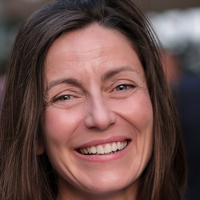 Francesca Demichelis is Head of the Laboratory of Computational and Functional Oncology at the University of Trento (Italy). She is an expert in the area of GU cancer genomics. Building on her initial work in Medical Informatics and classification approaches, her team focuses on the characterization of tumor evolution and progression through the study of intra- and inter-tumor heterogeneity from large cohorts of patients. Using single base level information from tissue biopsies and circulating material in patients’ plasma (e.g. cell free DNA), tumor dynamics is described to inform on patient’s status and treatment response specifically in the setting of metastatic prostate cancer. Computational and experimental approaches are jointly applied in her laboratory to nominate and validate potential synthetic lethal pairs from multi-layer human data. Her research group is involved in consortia studies including The Cancer Genome Atlas (TCGA) and Stand Up 2 Cancer International/ PCF Dream Team. Dr. Demichelis has received support from multiple funding agencies including the European Research Council, the Department of Defense (USA), the National Cancer Institute (NCI), the Prostate Cancer Foundation, the MIUR, the Italian Association for Cancer Research (AIRC) and Cancer Research-UK.
Francesca Demichelis is Head of the Laboratory of Computational and Functional Oncology at the University of Trento (Italy). She is an expert in the area of GU cancer genomics. Building on her initial work in Medical Informatics and classification approaches, her team focuses on the characterization of tumor evolution and progression through the study of intra- and inter-tumor heterogeneity from large cohorts of patients. Using single base level information from tissue biopsies and circulating material in patients’ plasma (e.g. cell free DNA), tumor dynamics is described to inform on patient’s status and treatment response specifically in the setting of metastatic prostate cancer. Computational and experimental approaches are jointly applied in her laboratory to nominate and validate potential synthetic lethal pairs from multi-layer human data. Her research group is involved in consortia studies including The Cancer Genome Atlas (TCGA) and Stand Up 2 Cancer International/ PCF Dream Team. Dr. Demichelis has received support from multiple funding agencies including the European Research Council, the Department of Defense (USA), the National Cancer Institute (NCI), the Prostate Cancer Foundation, the MIUR, the Italian Association for Cancer Research (AIRC) and Cancer Research-UK.
She trained at the University of Trento (Physics Department; Information and Communication Technology PhD School), did her post-doc at the Brigham and Women’s Hospital of Harvard Medical School, and first led her own laboratory at Weill Cornell Medicine (NY) between 2007-2011. She then joined the Faculty at the Department of Cellular, Computational and Integrative Biology at the University of Trento, where she is Professor in Molecular Biology.
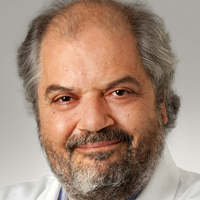 Prof. Di Fiore is Director of the Novel Diagnostics Program (formerly Molecular Medicine Program) at the European Institute of Oncology (IEO), a leading comprehensive cancer center in Milan. He is Full Professor of General Pathology and one of the founders of the European School of Molecular Medicine (SEMM), which offers Ph.D. programs in Biomedicine.
Prof. Di Fiore is Director of the Novel Diagnostics Program (formerly Molecular Medicine Program) at the European Institute of Oncology (IEO), a leading comprehensive cancer center in Milan. He is Full Professor of General Pathology and one of the founders of the European School of Molecular Medicine (SEMM), which offers Ph.D. programs in Biomedicine.
Di Fiore has dedicated his scientific career to deciphering the molecular mechanisms of cellular transformation, with particular emphasis on growth factor receptor signal transduction and attenuation, and more recently on stem cell biology.
In recent years, Di Fiore’s work has focused on translating knowledge accumulated on basic molecular oncology into real clinical tools for the amelioration of cancer patient management.
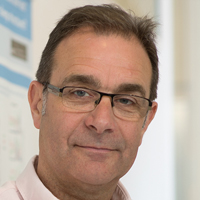 Michael Hastings is Programme Leader and Head of the Division of Neurobiology at the MRC Laboratory of Molecular Biology, Cambridge. He graduated BSc (First Class) (1977) in Marine Biology and PhD in Marine Ecology (1980), from Liverpool University. After a PGCE at Manchester (1981) he took a post-doc with Joe Herbert in Anatomy, University of Cambridge investigating the role of melatonin in seasonal fertility of mammals.
Michael Hastings is Programme Leader and Head of the Division of Neurobiology at the MRC Laboratory of Molecular Biology, Cambridge. He graduated BSc (First Class) (1977) in Marine Biology and PhD in Marine Ecology (1980), from Liverpool University. After a PGCE at Manchester (1981) he took a post-doc with Joe Herbert in Anatomy, University of Cambridge investigating the role of melatonin in seasonal fertility of mammals.
He was appointed Junior Lecturer (1984), and then Lecturer (1988) and Fellow at Queens' College, Cambridge (1987-1990), establishing his own laboratory into the neurobiology of circadian clocks, focussing on neurochemistry of environmental entrainment of the suprachiasmatic nucleus (SCN), the brain’s principal pacemaker. He was appointed Reader in Neuroscience (1998).
He moved to MRC Laboratory of Molecular Biology, Cambridge as Programme Leader in Circadian Neurobiology (2001) to develop molecular genetic approaches to SCN circadian time-keeping. This included elucidation of the mechanisms of cell-autonomous clocks, definition of the pathways whereby cellular oscillators of the SCN are synchronised into a robust time-keeping circuit, and the inter-relationships between the SCN, subordinate clocks across the brain, sleep and disease.
He was elected to Fellowship of the Academy of Medical Sciences (2008), President of the Society for Research on Biological Rhythms (2008), and to Fellowship of the Royal Society (2010). He was appointed Joint Head of the Division of Neurobiology (2013) and in 2016 became sole Head. He is a member of the MRC Neurosciences and Mental Health Board, and Deputy Chair of the Royal Society University Research Fellowships Committee.
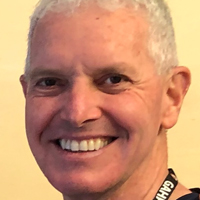 Tom Kirchhausen is an expert on mechanisms of intracellular membrane traffic and a leading authority on the molecular structures and interactions that underlie clathrin-mediated endocytosis. He has help defined the structure, interactions, and assembly-disassembly mechanisms of clathrin and many of its associated proteins, through studies extending over three decades. His work throughout this time has been characterized by pioneering use of emerging technologies -- from the early days of molecular cloning to contemporary live-cell imaging. He has used the tools of x-ray crystallography, electron cryomicroscopy, and single-molecule biophysics to create a "molecular movie" of clathrin-mediated endocytosis, and he has related these molecular events to functional properties of the surfaces of living cells.
Tom Kirchhausen is an expert on mechanisms of intracellular membrane traffic and a leading authority on the molecular structures and interactions that underlie clathrin-mediated endocytosis. He has help defined the structure, interactions, and assembly-disassembly mechanisms of clathrin and many of its associated proteins, through studies extending over three decades. His work throughout this time has been characterized by pioneering use of emerging technologies -- from the early days of molecular cloning to contemporary live-cell imaging. He has used the tools of x-ray crystallography, electron cryomicroscopy, and single-molecule biophysics to create a "molecular movie" of clathrin-mediated endocytosis, and he has related these molecular events to functional properties of the surfaces of living cells.
His talk will illustrate the use of recent revolutionary imaging modalities exemplified by the lattice light-sheet microscope with or without adaptive optics invented by Eric Betzig to make visible what is otherwise too small to be seen. These images, aquired in the form of 3-dimensional films, allow to ‘see’ processes in three dimensions and provide new visualization standards, previously unimaginable, to analyze, understand and transmit the knowledge acquired by the study of subcellular processes in the complex and dynamic three-dimensional environment of living cells in isolation in the laboratory or within tissues of an organism.
 Alberto Mantovani, MD, is Professor of Pathology at the Humanitas University in Milan, and Scientific Director of the Istituto Clinico Humanitas. His attention has been focused on molecular mechanisms of innate immunity and inflammation. He has contributed to the advancement of knowledge in the field of Immunology formulating new paradigms and identifying new molecules and functions.
Alberto Mantovani, MD, is Professor of Pathology at the Humanitas University in Milan, and Scientific Director of the Istituto Clinico Humanitas. His attention has been focused on molecular mechanisms of innate immunity and inflammation. He has contributed to the advancement of knowledge in the field of Immunology formulating new paradigms and identifying new molecules and functions.
For his research activity he has received several national and international awards, such as the Triennial OECI Award from the Organization of the European Cancer Institutes, the Robert Koch Award for his contribution to tumor immunology and immunotherapy and most recent, the American-Italian Cancer Foundation (AICF) Prize for Excellence in Medicine.The broad impact of his contributions is testified by citations. As of January 2019 he has over 111,000 (Scopus), 80,000 (Web of Science) or 160,000 (Google Scholar) citations and an H-index of 161 (Scopus), 125 (Web of Science) or 185 (Google Scholar).
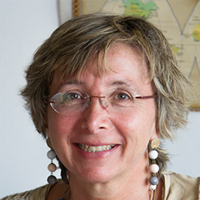 Simona Polo is director of the Ubiquitin and Signal Transduction research program at IFOM since 2005. Her laboratory
studies ubiquitin features not directly related to protein degradation. Her work, along with the work of other colleagues
in the field, led to the definition of ubiquitin as a signaling molecule, critical in the regulation of numerous cellular
pathways and frequently implicated in the pathogenesis of human diseases. In recognition of her studies, she received
the prestigious EMBO Young Investigator award in 2009, was elected EMBO member in 2016 and received the gold
medal ("Ambrogino d’Oro") from the Mayor of Milan in 2018. This prize is dedicated each year to a selection of
personalities who have distinguished themselves for a significant contribution to the city of Milan in the field of
entrepreneurship, culture, solidarity, science and research. Dr. Polo was selected for her outstanding achievements in
biology and for the rare ability to reconcile a scientific career with a family project.
Simona Polo is director of the Ubiquitin and Signal Transduction research program at IFOM since 2005. Her laboratory
studies ubiquitin features not directly related to protein degradation. Her work, along with the work of other colleagues
in the field, led to the definition of ubiquitin as a signaling molecule, critical in the regulation of numerous cellular
pathways and frequently implicated in the pathogenesis of human diseases. In recognition of her studies, she received
the prestigious EMBO Young Investigator award in 2009, was elected EMBO member in 2016 and received the gold
medal ("Ambrogino d’Oro") from the Mayor of Milan in 2018. This prize is dedicated each year to a selection of
personalities who have distinguished themselves for a significant contribution to the city of Milan in the field of
entrepreneurship, culture, solidarity, science and research. Dr. Polo was selected for her outstanding achievements in
biology and for the rare ability to reconcile a scientific career with a family project.
Research in her lab is currently focus on the NEDD4 family of ubiquitin E3s. These enzymes are critical determinants of
substrate and ubiquitin chain specificity, and are central coordinators of the activation of downstream signaling pathways.
In Polo lab, biochemical and biophysical techniques, including mass spectrometry and crystallography, are coupled with
classical mammalian cell-based assays and with the use of Drosophila model system.
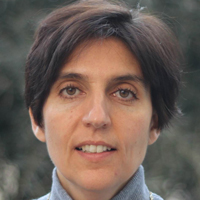 Maria Rescigno graduated in Biology in 1990 at the University of Milan. From 1991 to 1994 she worked at the University of Cambridge, UK, in the Department of Biochemistry, as a visiting scholar. From 1995 to 1999, she worked at the National Research Council of Milan where she received her PhD in Pharmacology and toxicology in 1999. From 1999 to 2001 she worked at the University of Milano-Bicocca where she specialized in Applied Biotechnology. From 2001 to 2017 she has been the director of the Dendritic cell biology and immunotherapy Unit at the Department of Experimental Oncology at the European Institute of oncology. She was the first to show that dendritic cells actively participate to bacterial uptake in the gut and the existence of a gut vascular barrier that resembles the blood brain barrier. Her major field of interest is mucosal immunology and the development of new cancer immunotherapy strategies. She authored more than 130 publications in high impact journals including Science, Nature Immunol, Immunity, J. Exp. Med., Science TM. She was nominated EMBO young investigator in 2007. In 2008-2013 she was visiting professor at the University of Oslo. In 2011 Maria Rescigno won the Avon prize as ‘Woman symbol of the city of Milan’ and was elected EMBO member. She has been the recipient of three ERC grants (starting, proof-of-concept and consolidator). In 2016 Maria Rescigno has founded Postbiotica s.r.l. a spin-off of the University of Milan that exploits microbiota-derived metabolites as new pharmaceutical agents. In 2017 Postbiotica has won two competitions: Bioupper (Italy) and MyStart BCN (Spain). From 2018 she is full professor at Humanitas University and group leader at Humanitas Research hospital, Milan.
Maria Rescigno graduated in Biology in 1990 at the University of Milan. From 1991 to 1994 she worked at the University of Cambridge, UK, in the Department of Biochemistry, as a visiting scholar. From 1995 to 1999, she worked at the National Research Council of Milan where she received her PhD in Pharmacology and toxicology in 1999. From 1999 to 2001 she worked at the University of Milano-Bicocca where she specialized in Applied Biotechnology. From 2001 to 2017 she has been the director of the Dendritic cell biology and immunotherapy Unit at the Department of Experimental Oncology at the European Institute of oncology. She was the first to show that dendritic cells actively participate to bacterial uptake in the gut and the existence of a gut vascular barrier that resembles the blood brain barrier. Her major field of interest is mucosal immunology and the development of new cancer immunotherapy strategies. She authored more than 130 publications in high impact journals including Science, Nature Immunol, Immunity, J. Exp. Med., Science TM. She was nominated EMBO young investigator in 2007. In 2008-2013 she was visiting professor at the University of Oslo. In 2011 Maria Rescigno won the Avon prize as ‘Woman symbol of the city of Milan’ and was elected EMBO member. She has been the recipient of three ERC grants (starting, proof-of-concept and consolidator). In 2016 Maria Rescigno has founded Postbiotica s.r.l. a spin-off of the University of Milan that exploits microbiota-derived metabolites as new pharmaceutical agents. In 2017 Postbiotica has won two competitions: Bioupper (Italy) and MyStart BCN (Spain). From 2018 she is full professor at Humanitas University and group leader at Humanitas Research hospital, Milan.
H-index: 55
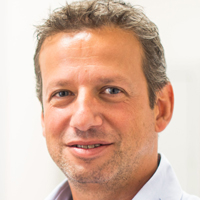 Marco Sandri is Full Professor of Pathology at Department of Biomedical Science, University of Padova. He received his M.D. degree from the University of Padova, he became specialist in Pathology at Medical School of the University of Padova. He carried out postdoctoral work in Alfred L Goldberg lab in Harvard Medical School. In 2005 he was awarded by the prestigious Dulbecco Telethon prize and established his lab at Venetian Institute of Molecular Medicine in Padova. Marco Sandri has also an honorary position as Adjunct Professor at McGill University, Montreal, Canada from 2011. He is a reviewer for the European Commission (ERC) and has been panel member of ERC consolidator program. He is particularly interested in understanding the signaling pathways that control muscle mass with a focus on the role of the ubiquitin-proteasome and autophagy-lysosome systems. He was the first to show a transcriptional-dependent regulation of autophagy and protein breakdown. His research has provided insights into mechanisms of regulation of these proteolytic systems and to metabolic adaptations to physical activity. For his contribution to the regulation of protein breakdown, Marco Sandri was invited to give lectures in several research centers, among them the Harvard Medical School in Boston, the Imperial College of London, the Institut Pasteur in Paris, , the Oxford University, the Medical Research Council in Cambridge, the McGill University in Montreal, the University of Pennsylvania of Philadelphia, and many others.
Marco Sandri is Full Professor of Pathology at Department of Biomedical Science, University of Padova. He received his M.D. degree from the University of Padova, he became specialist in Pathology at Medical School of the University of Padova. He carried out postdoctoral work in Alfred L Goldberg lab in Harvard Medical School. In 2005 he was awarded by the prestigious Dulbecco Telethon prize and established his lab at Venetian Institute of Molecular Medicine in Padova. Marco Sandri has also an honorary position as Adjunct Professor at McGill University, Montreal, Canada from 2011. He is a reviewer for the European Commission (ERC) and has been panel member of ERC consolidator program. He is particularly interested in understanding the signaling pathways that control muscle mass with a focus on the role of the ubiquitin-proteasome and autophagy-lysosome systems. He was the first to show a transcriptional-dependent regulation of autophagy and protein breakdown. His research has provided insights into mechanisms of regulation of these proteolytic systems and to metabolic adaptations to physical activity. For his contribution to the regulation of protein breakdown, Marco Sandri was invited to give lectures in several research centers, among them the Harvard Medical School in Boston, the Imperial College of London, the Institut Pasteur in Paris, , the Oxford University, the Medical Research Council in Cambridge, the McGill University in Montreal, the University of Pennsylvania of Philadelphia, and many others.
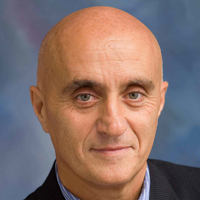 His research has focused on the molecular mechanisms of transcriptional regulation and chromatin remodeling, specifically in response to changes in signaling transduction and cellular metabolism. He has uncovered the specific role of transcriptional and epigenetic regulators in circadian clock function and deciphered how metabolic circuits intimately connect to the circadian system. His studies have significantly impacted the fields of transcription, epigenetics, metabolism and endocrinology. Most recently he has revealed how nutritional challenges reprogram circadian homeostasis, explored the molecular mechanisms that involve the NAD+-dependent class of deacetylases and revealed previously unforeseen pathways of circadian control that connect to nutrition, cancer and aging.
His research has focused on the molecular mechanisms of transcriptional regulation and chromatin remodeling, specifically in response to changes in signaling transduction and cellular metabolism. He has uncovered the specific role of transcriptional and epigenetic regulators in circadian clock function and deciphered how metabolic circuits intimately connect to the circadian system. His studies have significantly impacted the fields of transcription, epigenetics, metabolism and endocrinology. Most recently he has revealed how nutritional challenges reprogram circadian homeostasis, explored the molecular mechanisms that involve the NAD+-dependent class of deacetylases and revealed previously unforeseen pathways of circadian control that connect to nutrition, cancer and aging.
After PhD in Italy and postdoctoral studies in France and USA (1980-1988), he established his research group in Strasbourg, France, with the position of Directeur de Recherche (1989-2006). Moved to University of California, Irvine as Distinguished Professor and Chair of the Department of Pharmacology (2006-2011) and then as Director of the Center for Epigenetics and Metabolism (2011-present) and Donald Bren Professor (2011-present). He is also External Professor of the Max-Planck Institute (Germany). Honors (partial list): EMBO Gold Medal (1994); Grand Prix Liliane Bettencourt, France (1997); Grand Prix Charles-Léopold Mayer of the Académie des Sciences, Paris (2003); Edwin B. Astwood Award, Endocrine Society, USA (2004); Ipsen Award in Endocrinology (2011); Transatlantic Medal of The Society of Endocrinology, UK (2012); Fellow of AAAS (2014); August and Marie Krogh Medal, Denmark (2015); Leonardo da Vinci Gold Medal (2016); Albert Hogan Memorial Award (2017); University of California Distinguished Faculty Award for Research (2018).
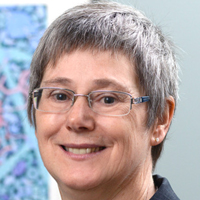 Dr. Schmid studies the molecular mechanisms and regulation underlying clathrin-mediated endocytosis, the major pathway for uptake into the cell and a critical regulator of cell-cell and cell-environment communication. She was a pioneer in defining the GTPase dynamin as a paradigmatic catalyst of membrane fission and elucidating its mechanism of action. More recently, she has discovered isoform-specific functions of dynamin that are activated in cancer cells to (dys)regulate early stages of endocytic trafficking. In addition to her research program, Dr. Schmid has been a leader in the scientific community as co-founding editor of Traffic, Editor-in-Chief of Molecular Biology of the Cell, and former President of the American Society for Cell Biology (ASCB). Her research and leadership contributions have been recognized by numerous awards including the ASCB/WICB Jr. and Sr. Career Recognition Awards, the William C. Rose Award from the ASBMB, the Sir Bernard Katz Award from the Biophysics Society and most recently the Arthur Kornberg and Paul Berg Lifetime Achievement Award in Biomedical Sciences. She was elected a member of the American Academy of Arts and Sciences in 2015. Dr. Schmid earned her doctorate at Stanford University and was a Helen Hay Whitney and Lucille P. Markey Postdoctoral Fellow at Yale University before starting her laboratory at The Scripps Research Institute in 1988. She moved to UT Southwestern in 2012.
Dr. Schmid studies the molecular mechanisms and regulation underlying clathrin-mediated endocytosis, the major pathway for uptake into the cell and a critical regulator of cell-cell and cell-environment communication. She was a pioneer in defining the GTPase dynamin as a paradigmatic catalyst of membrane fission and elucidating its mechanism of action. More recently, she has discovered isoform-specific functions of dynamin that are activated in cancer cells to (dys)regulate early stages of endocytic trafficking. In addition to her research program, Dr. Schmid has been a leader in the scientific community as co-founding editor of Traffic, Editor-in-Chief of Molecular Biology of the Cell, and former President of the American Society for Cell Biology (ASCB). Her research and leadership contributions have been recognized by numerous awards including the ASCB/WICB Jr. and Sr. Career Recognition Awards, the William C. Rose Award from the ASBMB, the Sir Bernard Katz Award from the Biophysics Society and most recently the Arthur Kornberg and Paul Berg Lifetime Achievement Award in Biomedical Sciences. She was elected a member of the American Academy of Arts and Sciences in 2015. Dr. Schmid earned her doctorate at Stanford University and was a Helen Hay Whitney and Lucille P. Markey Postdoctoral Fellow at Yale University before starting her laboratory at The Scripps Research Institute in 1988. She moved to UT Southwestern in 2012.
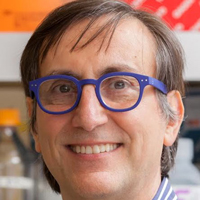 Dr. Alessandro Sette has devoted more than 30 years to understanding and measuring immune responses, and developing disease intervention strategies against cancer, autoimmunity, allergy, and infectious diseases. Dr. Sette laboratory is focused on the study of the specific structures (epitopes) that the immune system recognizes, and uses this knowledge to define the immune signatures associated with protective immunity versus immunopathology.
Dr. Alessandro Sette has devoted more than 30 years to understanding and measuring immune responses, and developing disease intervention strategies against cancer, autoimmunity, allergy, and infectious diseases. Dr. Sette laboratory is focused on the study of the specific structures (epitopes) that the immune system recognizes, and uses this knowledge to define the immune signatures associated with protective immunity versus immunopathology.
Dr. Sette is the Head of LJI's Division of Vaccine Discovery. He created and directs since the early 2000s the Immune Epitope Database, a freely available, widely used bioinformatics resource. Dr. Sette has a doctorate in Biological Sciences from the University of Rome and was a postdoctoral fellow at the National Jewish Center in Denver, Colorado. In 1988, Dr. Sette joined Cytel Corp. and in 1997 founded Epimmune, where was VP of Research and Chief Scientific Officer until 2002, when he joined LJI.
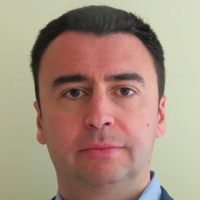 Dr Nicola Valeri is Associate Professor in Personalized Oncology and leads the Gastrointestinal Cancer Biology and Genomics team at the Institute of Cancer Research in London, UK. He is also clinically active and works as a Consultant Medical Oncologist at the Royal Marsden Hospital in London. His laboratory and clinical research focus on gastrointestinal cancers with a special interest in colorectal and gastro-oesophageal cancers.
Dr Nicola Valeri is Associate Professor in Personalized Oncology and leads the Gastrointestinal Cancer Biology and Genomics team at the Institute of Cancer Research in London, UK. He is also clinically active and works as a Consultant Medical Oncologist at the Royal Marsden Hospital in London. His laboratory and clinical research focus on gastrointestinal cancers with a special interest in colorectal and gastro-oesophageal cancers.
Dr Valeri received his medical training in Italy and worked in the United States at the Ohio State University Comprehensive Cancer Center, looking at the role of non-coding RNAs in gastrointestinal cancers. He was a Senior Clinical Lecturer at Glasgow University between 2012 and 2013 before being appointed as a Team Leader at the Institute of Cancer Research in London in 2013.
Dr Valeri’s lab is investigating novel bio-markers of response and resistance to treatment in gastrointestinal cancer patients. Using tissue and liquid biopsies, his team aims to define molecular mechanisms and dynamics that govern primary and acquired resistance to anti-cancer treatment. Dr Valeri’s team is also developing large bio-banks of mini-tumours, known as organoids, from metastatic cancer patients to model treatment response.
Dr Valeri has received numerous awards including the Alexander Bodini International Fellowship from the American-Italian Cancer foundation and the Sidney Kimmel Translational Research Scholar Award in USA, the Astra-Zeneca Prize from the National Cancer Research Institute and Medical Research Society Prize from the Academy of Medical Sciences in UK. He was elected Fellow of the London Royal College of Physicians in 2019.
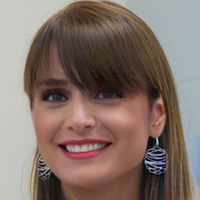 Antonella Viola is full professor of General Pathology at the Department of Biomedical Sciences, University of Padova, and Scientific Director of the Pediatric Research Institute (Istituto Ricerca Pediatrica, IRP). She was a scientific member of the Basel Institute of Immunology, EMBO (European Molecular Biology Organization) researcher, and head of the Adaptive Immunity Laboratories at the Humanitas Research Centre (Milan). She coordinated several Italian, European and US research projects aimed at studying the relationship between immune system and diseases.
She is a reviewer for the European Commission (ERC programs) and EMBO member.
For her contributions to immunology, she received several awards among which the Roche Prize, the award of the Cancer Research Institute of New York, the prize “Chiara D'Onofrio”, the EMBO Young Investigator Award, the prize from Belisario Foundation. Professor Viola was invited to give lectures in several research centers, among which the Imperial College of London, the Institut Pasteur in Paris, the Harvard Medical School in Boston, the Oxford University, the Medical Research Council in Cambridge, the Jefferson University of Philadelphia, and many others.
Currently, she coordinates an ERC AdG project on inflammation (STePS) and she is work-package leader of an European project on stem cells transplantation (MERLIN).
Antonella Viola is full professor of General Pathology at the Department of Biomedical Sciences, University of Padova, and Scientific Director of the Pediatric Research Institute (Istituto Ricerca Pediatrica, IRP). She was a scientific member of the Basel Institute of Immunology, EMBO (European Molecular Biology Organization) researcher, and head of the Adaptive Immunity Laboratories at the Humanitas Research Centre (Milan). She coordinated several Italian, European and US research projects aimed at studying the relationship between immune system and diseases.
She is a reviewer for the European Commission (ERC programs) and EMBO member.
For her contributions to immunology, she received several awards among which the Roche Prize, the award of the Cancer Research Institute of New York, the prize “Chiara D'Onofrio”, the EMBO Young Investigator Award, the prize from Belisario Foundation. Professor Viola was invited to give lectures in several research centers, among which the Imperial College of London, the Institut Pasteur in Paris, the Harvard Medical School in Boston, the Oxford University, the Medical Research Council in Cambridge, the Jefferson University of Philadelphia, and many others.
Currently, she coordinates an ERC AdG project on inflammation (STePS) and she is work-package leader of an European project on stem cells transplantation (MERLIN).
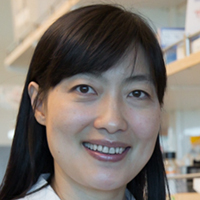 Haining Yang, MD PhD, is a Tenured Professor at the University of Hawai’i Cancer Center. Dr. Yang’s research work focuses on the pathogenesis of mesothelioma, a malignancy often related to exposure to asbestos or other carcinogenic mineral fibers. Her research goal is to find novel strategies for mesothelioma early detection, prevention and therapy. During years of study, Dr. Yang has discovered some key mechanisms of asbestos-induced carcinogenesis. Dr. Yang’s research is funded by the National Cancer Institute, the V-Foundation and the Department of Defense, etc. Dr. Yang was awarded EU Marie Curie Scholarship from the European Commission Marie Curie Actions Program in 2005, and she was one of the recipients of the American Association for Cancer Research (AACR) Innovative Landon Award for International Collaboration in Cancer Research in 2008. More recently, she received 2018 iMiG (International Mesothelioma Research Group) Research award. She has two approved and one pending patents.
Haining Yang, MD PhD, is a Tenured Professor at the University of Hawai’i Cancer Center. Dr. Yang’s research work focuses on the pathogenesis of mesothelioma, a malignancy often related to exposure to asbestos or other carcinogenic mineral fibers. Her research goal is to find novel strategies for mesothelioma early detection, prevention and therapy. During years of study, Dr. Yang has discovered some key mechanisms of asbestos-induced carcinogenesis. Dr. Yang’s research is funded by the National Cancer Institute, the V-Foundation and the Department of Defense, etc. Dr. Yang was awarded EU Marie Curie Scholarship from the European Commission Marie Curie Actions Program in 2005, and she was one of the recipients of the American Association for Cancer Research (AACR) Innovative Landon Award for International Collaboration in Cancer Research in 2008. More recently, she received 2018 iMiG (International Mesothelioma Research Group) Research award. She has two approved and one pending patents.
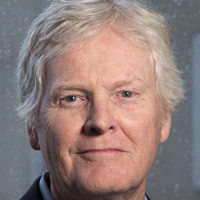 Michael Young is Richard and Jeanne Fisher Professor and Head of the Laboratory of Genetics at The Rockefeller University. He is also the University’s Vice-President for Academic Affairs. Young received a B.A. in biology in 1971 and a Ph.D. in genetics in 1975, both from The University of Texas, Austin. His graduate work, with Burke Judd, examined gene sizes and distributions in the chromosomes of Drosophila. He moved to Rockefeller in 1978, following postdoctoral work on transposable elements with David Hogness in the Department of Biochemistry, Stanford University School of Medicine.
Michael Young is Richard and Jeanne Fisher Professor and Head of the Laboratory of Genetics at The Rockefeller University. He is also the University’s Vice-President for Academic Affairs. Young received a B.A. in biology in 1971 and a Ph.D. in genetics in 1975, both from The University of Texas, Austin. His graduate work, with Burke Judd, examined gene sizes and distributions in the chromosomes of Drosophila. He moved to Rockefeller in 1978, following postdoctoral work on transposable elements with David Hogness in the Department of Biochemistry, Stanford University School of Medicine.
In the late 1970s, Young began to use the fruit fly, Drosophila, to explore the molecular bases of circadian (daily) rhythms. Molecular and genetic screens in his laboratory identified six genes that are involved in the formation of a biochemical oscillator with a periodicity close to 24 hours. Interactions among these genes, and their proteins, contribute to a network of molecular oscillations that emerge within most tissues at the level of single cells. Most of the “clock genes” discovered by Young and his colleagues in Drosophila are also central to the circadian pathways of vertebrates. Recently Young’s laboratory showed that a prevalent human sleep disorder is caused by dysfunction of such a well-conserved circadian clock gene. Young’s elected memberships include the U.S. National Academy of Sciences, the American Philosophical Society, the President’s Council of the New York Academy of Sciences, the American Academy of Microbiology, and the Physiological Society, London (Honorary). Along with colleagues Jeffrey Hall and Michael Rosbash, he received the 2009 Gruber Neuroscience Prize, 2011 Horwitz Prize, 2012 Canada Gairdner International Award, 2012 Massry Prize, 2013 Wiley Prize, 2013 Shaw Prize and the 2017 Nobel Prize in Physiology or Medicine for discoveries of molecular mechanisms that control circadian rhythms.